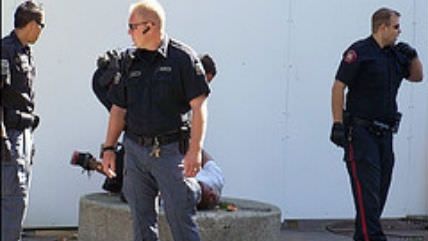Support Grows for Cops to Wear On-Body Cameras

The push for cops to start wearing on-body cameras while on duty is gaining momentum.
Last week, the American Civil Liberties Union issued a position paper in support of the practice. Although the ACLU is generally opposed to increases in state survelliance, they endorsed the idea as "a way to serve as a check against the abuse of power by police officers."

The civil liberties group is one of the latest to join a growing coalition of academics, judges, journalists, politicians, and others calling for cops to start wearing lapel cameras on duty. The motivations are clear: Allegations of police misconduct are rampant and disputes between citizens and law enforcement officials are highly contentious. In cities across the country, Americans file hundreds of complaints against their local police departments every year. Many of these cases go unresolved or even ignored. Proponents of cops wearing portable recording devices believe that adding an "objective record" of the incidences will help mitigate the problem.
When a federal judge ruled New York City's stop-and-frisk policy unconstitutional in August, she ordered the department to implement a test run of wearable police cameras on the grounds that video footage of police stops could either "confirm or refute the belief of some minorities that they have been stopped simply as a result of their race." (Mayor Bloomberg has so far resisted implementing the program.)
In September, the Baltimore Sun penned an editorial in favor of the practice, saying it will help "restore trust" between police departments and the public.
Earlier this week, Flex Your Rights, a nonprofit that educates citizens about their constitutional rights when interacting with police, told Reason.com that they advocate for on-body cameras because it levels the playing field between police and citizens:
Without contradictory evidence, the officer's word is usually the official story. But the ubiquity of cameras threatens to destroy this power.
The claims that on-body cameras could help are backed by evidence. A 12-month study conducted by Cambridge University, which Reason first covered back in August, found that "when the city of Rialto, California, required its cops to wear cameras, the number of complaints filed against officers fell by 88 percent and the use of force by officers dropped by almost 60 percent." Additionally, several police departments that require officers to wear on-body cameras have reported positive results. Six months after Laurel, Maryland, bought lapel cameras for their officers, they observed plummeting numbers of police force incidences and citizen complaints.
As of yet, few police departments use on-body cameras.


Show Comments (31)